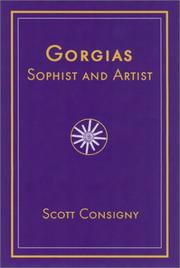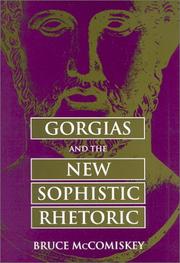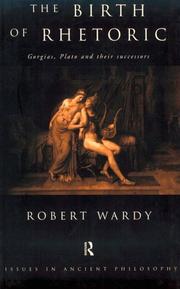| Listing 1 - 9 of 9 |
Sort by
|
Book
ISBN: 3896650572 Year: 1999 Publisher: Sankt Augustin : Academia Verlag,
Abstract | Keywords | Export | Availability | Bookmark
 Loading...
Loading...Choose an application
- Reference Manager
- EndNote
- RefWorks (Direct export to RefWorks)
Book
ISBN: 9781942495550 Year: 2022 Publisher: [Place of publication not identified] : Parnassos Press - Fonte Aretusa,
Abstract | Keywords | Export | Availability | Bookmark
 Loading...
Loading...Choose an application
- Reference Manager
- EndNote
- RefWorks (Direct export to RefWorks)
Gorgias of Leontinoi in Sicily is widely considered to be the most prominent and important of the sophists. He traveled to Athens in 427 BCE-about the time Plato was born-where he earned both the ire of philosophers and the obols of young men keen on learning the powerful art of logos. As the dialogue named for him shows, Gorgias is representative for Plato of rhetoric and sophistry and all the ways in which they stray from, or even threaten, the philosophical attainment of truth, thereby imperiling the well-being of the polis. Although some of Gorgias's work survives-and is included here in new translations-none of it is as widely studied as Plato's Gorgias. For this and other reasons, there has been a scholarly tendency to treat rhetoric and Gorgias himself as opposed, or even antithetical to, philosophy. As the articles in this volume make clear, however, there is much that is philosophical in Gorgias's work, just as there is much that is rhetorical in the method of Plato's Socrates. In fact, there is great nuance to Plato's treatment of Gorgias's rhetorical abilities, and Gorgias himself can be understood as a subtle and sophisticated (in the positive sense) philosopher. In short, the papers collected here show that the relationship between Plato and Gorgias-and, more generally, between philosophy and rhetoric-is much more complicated, and potentially more mutually beneficial, than is traditionally recognized.
Philosophy --- Gorgias, --- Gorgia, --- Gorgiasz --- Γοργίας,
Book
ISBN: 9789025607272 9025607276 Year: 1974 Publisher: Amsterdam: Hakkert,
Abstract | Keywords | Export | Availability | Bookmark
 Loading...
Loading...Choose an application
- Reference Manager
- EndNote
- RefWorks (Direct export to RefWorks)

ISBN: 1570034249 Year: 2001 Publisher: Columbia University of South Carolina press
Abstract | Keywords | Export | Availability | Bookmark
 Loading...
Loading...Choose an application
- Reference Manager
- EndNote
- RefWorks (Direct export to RefWorks)
Gorgias of Leontini --- Gorgias, --- Gorgia, --- Gorgiasz --- Γοργίας,
Book
ISBN: 2859391517 9782859391515 Volume: v. 4 Publisher: Lille: Presses universitaires de Lille,
Abstract | Keywords | Export | Availability | Bookmark
 Loading...
Loading...Choose an application
- Reference Manager
- EndNote
- RefWorks (Direct export to RefWorks)
History of philosophy --- Classical Greek literature --- Melissus, --- Xenophanes, --- Gorgias, --- Senofane, --- Xénophane, --- Ξενοφάνης, --- Xenophanēs, --- Melisso, --- Μέλισσος, --- Melissos, --- Gorgia, --- Gorgiasz --- Γοργίας, --- Ksenofanes, --- Melissus, - Samius --- Xenophanes, - approximately 570 BC-approximately 478 BC --- Gorgias, - of Leontini
Book
ISBN: 9783487143088 3487143089 Year: 2010 Volume: 130 Publisher: Hildesheim: Olms,
Abstract | Keywords | Export | Availability | Bookmark
 Loading...
Loading...Choose an application
- Reference Manager
- EndNote
- RefWorks (Direct export to RefWorks)
Sophists (Greek philosophy) --- Sophistes grecs --- Early works to 1800. --- Ouvrages avant 1800 --- Gorgias, --- Criticism and interpretation --- Philosophy, Ancient --- Gorgia, --- Gorgiasz --- Γοργίας, --- Criticism and interpretation. --- Sophists (Greek philosophy) - Early works to 1800 --- Gorgias, - of Leontini - Criticism and interpretation --- Gorgias (0483?-0380? av. J.-C.) --- Sophistes (philosophie grecque) --- Critique et interprétation --- Gorgias, - of Leontini

ISBN: 0809323974 0809331365 9786613884473 0809390132 1283572028 1429417722 9780809390137 9781429417723 9781283572026 9780809323975 9780809331369 6613884472 Year: 2002 Publisher: Carbondale Southern Illinois University Press
Abstract | Keywords | Export | Availability | Bookmark
 Loading...
Loading...Choose an application
- Reference Manager
- EndNote
- RefWorks (Direct export to RefWorks)
In Gorgias and the New Sophistic Rhetoric, Bruce McComiskey achieves three rhetorical goals: he treats a single sophist's rhetorical technê (art) in the context of the intellectual upheavals of fifth-century bce Greece, thus avoiding the problem of generalizing about a disparate group of individuals; he argues that we must abandon Platonic assumptions regarding the sophists in general and Gorgias in particular, opting instead for a holistic reading of the Gorgianic fragments; and he reexamines the practice of appropriating sophistic doctrines, particularly
Rhetoric, Ancient. --- Sophists (Greek philosophy). --- Plato. --- Gorgias, --- Rhetoric, Ancient --- Sophists (Greek philosophy) --- Philosophy, Ancient --- Classical languages --- Greek language --- Greek rhetoric --- Latin language --- Latin rhetoric --- Rhetoric --- Plato --- Gorgias of Leontini --- Aflāṭūn --- Aplaton --- Bolatu --- Platon, --- Platonas --- Platone --- Po-la-tʻu --- Pʻŭllatʻo --- Pʻŭllatʻon --- Pʻuratʻon --- Πλάτων --- אפלטון --- פלאטא --- פלאטאן --- פלאטו --- أفلاطون --- 柏拉圖 --- 플라톤 --- Ancient rhetoric --- Gorgia, --- Gorgiasz --- Γοργίας,

ISBN: 0415146429 0415146437 9780415146425 9780415146432 Year: 2003 Publisher: London: Routledge,
Abstract | Keywords | Export | Availability | Bookmark
 Loading...
Loading...Choose an application
- Reference Manager
- EndNote
- RefWorks (Direct export to RefWorks)
Rhetoric, Ancient --- 162 --- Ancient rhetoric --- Classical languages --- Greek language --- Greek rhetoric --- Latin language --- Latin rhetoric --- 162 Besluitvorming. Retoriek. Filosofische argumentatie. Redeneerprocessen --- Besluitvorming. Retoriek. Filosofische argumentatie. Redeneerprocessen --- Rhetoric --- Gorgias, --- Plato. --- Gorgia, --- Gorgiasz --- Γοργίας, --- Rhetoric, Ancient. --- Philosophy, Ancient --- Rhétorique ancienne --- Philosophie ancienne --- Rhetoric [Ancient ] --- Plato --- Plato. - Gorgias. --- Gorgias, - of Leontini.
Book
ISBN: 9783515128599 9783515128643 3515128646 351512859X Year: 2021 Volume: 125 Publisher: Berlin: Franz Steiner,
Abstract | Keywords | Export | Availability | Bookmark
 Loading...
Loading...Choose an application
- Reference Manager
- EndNote
- RefWorks (Direct export to RefWorks)
Nach vorherrschender Meinung veranschaulicht Platon im Gorgias die Wirkungslosigkeit der Sokratischen Gesprächsmethode, da er Sokrates vor allem heftige Vorwürfe und Spott ernten lässt.Bernhard Kaiser argumentiert hingegen dafür, die emotionalen Reaktionen als Indikator zu werten, dass die Gesprächspartner wirksam in ihrem Selbstverständnis erschüttert werden. Sokratesˈ Vorgehen ist in Analogie zur medizinischen Behandlung als Seelentherapie konzipiert, wobei der Akzent der Darstellung auf dem Schmerz liegt, den die Behandlung häufig mit sich bringt. Die verbalen Angriffe gegen Sokrates lassen sich somit als Abwehrreaktionen auf die unangenehmen Begleiterscheinungen der psychischen Transformationsprozesse lesen, die durch die argumentativen Widerlegungen eingeleitet werden.Die Einbettung der Konfliktsituationen in das Handlungsgeschehen bietet zugleich die Gelegenheit, die therapeutischen Tugenden des Sokrates unter Beweis zu stellen: Platon lässt ihn im Interesse der Gesprächspartner stets besonnen reagieren und unerschrocken gegen die Widerstände ankämpfen. Die erhobenen Vorwürfe erweisen sich dabei als unzutreffend. Kaiser arbeitet insbesondere heraus, dass Sokrates auf den Gebrauch der eironeia verzichtet.
Platon (0427?-0348? av. J.-C.).
---
E-books
---
Ressentiment
---
Dialog
---
Plato
---
Socrates
---
Gorgias
---
(Produktform)Electronic book text
---
Sokratische Methode
---
Straftheorie
---
Therapeutische Tugend
---
Therapiemethode
---
Wahrhaftigkeit
---
Widerlegung
---
Wohlwollen
---
agonal
---
Behandlungsschmerz
---
Beschämung
---
Besonnenheit
---
Dialektik
---
Eironeia
---
Elenchos
---
Elenktik
---
Emotionen
---
Eristik
---
Gerechtigkeit
---
Gerichtsmetaphorik
---
Kognitive Dissonanz
---
Medizinanalogie
---
Ordnung der Seele
---
Parrhesie
---
Rhetorik
---
Richter
---
Scham
---
Schlussmythos
---
Seelenheilung
---
Sokratische Ironie
---
Agon
---
Altphilologie
---
Antilogik
---
Apologie des Sokrates
---
(VLB-WN)9567
---
Zwiegespräch
---
Dialoge
---
Dialogue
---
Wechselrede
---
Gespräch
---
Vorurteil
---
Gorgias Leontinos
---
Gorgias Leontinus
---
Leontinus, Gorgias
---
Gorgias von Leontinoi
---
Gorgia
---
Gorgia di Lentini
---
Gorgia da Lentini
---
Gorgios
---
Georgias
---
Philosoph
---
Redner
---
Rhetor
---
v480-v380
---
v05
---
-v04
---
-Aristokles
---
Eflātun
---
Eflatun
---
Platonius
---
Platão
---
Platōnas
---
Platonas
---
Pseudo-Plato
---
Platao
---
Po-la-t'u
---
Bolatu
---
P'urat'on
---
P'ullat'o
---
P'ullat'on
---
Ps.-Platon
---
Pġaton
---
Aflaṭôn
---
Aplaṭôn
---
Aflāṭūn
---
Platōn
---
Platon
---
Platone
---
Pseudo-Platon
---
プラトーン
---
Պղատոն
---
أفلاطون
---
柏拉圖
---
פלטו
---
פלאטו
---
פלאטאן
---
Athen
---
Beurer, Johannes Jakob
---
Vietor, Theodor
---
Cornarius, Janus
---
Gessner, Conrad
---
Serres, Jean <
| Listing 1 - 9 of 9 |
Sort by
|

 Search
Search Feedback
Feedback About UniCat
About UniCat  Help
Help News
News